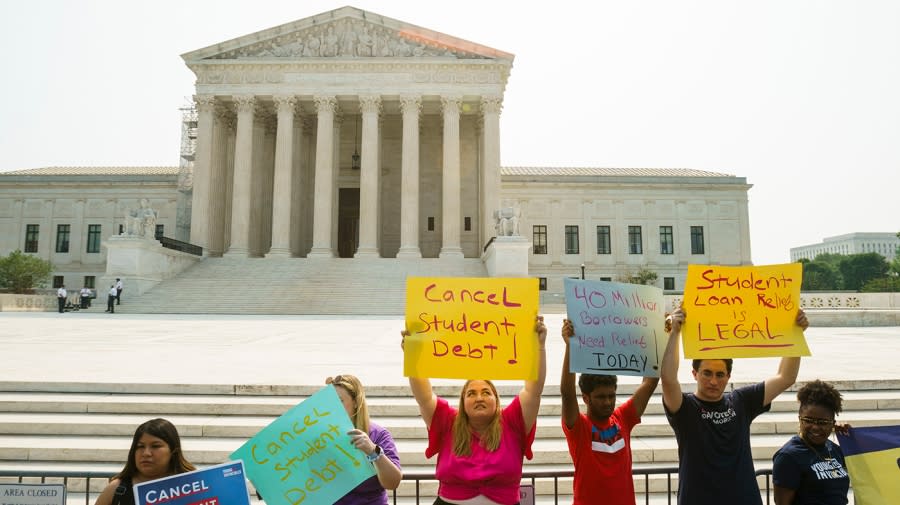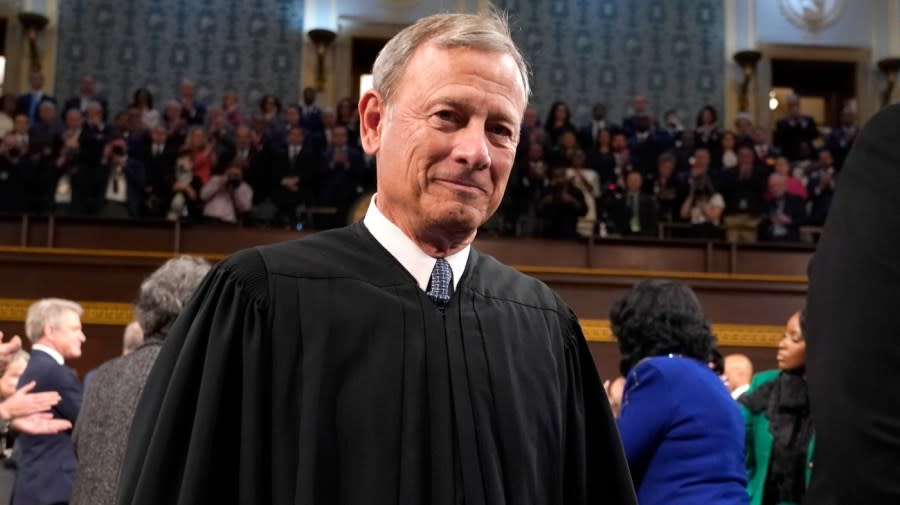Supreme Court strikes down Biden’s student debt forgiveness plan

- Oops!Something went wrong.Please try again later.
- Oops!Something went wrong.Please try again later.
- Oops!Something went wrong.Please try again later.
The Supreme Court on Friday blocked the Biden administration’s student debt relief plan in a 6-3 decision, stopping more than 40 million borrowers from receiving loan forgiveness and delivering a major defeat to one of the president’s key campaign promises.
Chief Justice John Roberts, writing for himself and his five conservative colleagues, ruled that Congress had not authorized the executive branch to forgive the debts that are estimated at hundreds of billions of dollars.
“The Secretary asserts that the HEROES Act grants him the authority to cancel $430 billion of student loan principal. It does not,” Roberts wrote.
“We hold today that the Act allows the Secretary to ‘waive or modify’ existing statutory or regulatory provisions applicable to financial assistance programs under the Education Act, not to rewrite that statute from the ground up,” Roberts continued.
More on SCOTUS’s student loans ruling from The Hill
Supreme Court blocks student loan forgiveness: What should borrowers do now?
READ: Kagan’s dissent in Biden v. Nebraska student loan forgiveness case
READ: Supreme Court rulings on Biden’s student loan forgiveness plan
Supreme Court strikes down Biden’s student debt forgiveness plan
The high-stakes decision will likely limit President Biden’s options to deliver on his commitment to cancel $10,000 of student loans for low- and middle-income borrowers.
Biden’s plan would have canceled up to $20,000 in loans for Pell Grant recipients and $10,000 for other borrowers, if the individual’s income is below $125,000. The income limit was doubled for married couples.
In a dissent, Justice Elena Kagan, writing for herself and fellow liberal Justices Sonia Sotomayor and Ketanji Brown Jackson, chastised the majority for exceeding its “proper, limited role.” Kagan read portions of the dissent aloud from the bench, a rare occurrence saved for when justices want to highlight their viewpoint.
“The right answer is the political branches: Congress in broadly authorizing loan relief, the Secretary and the President in using that authority to implement the forgiveness plan. The majority instead says that it is theirs to decide,” Kagan wrote in dissent.
Anticipation had been building that the court’s conservative majority would strike down the plan. During oral arguments in February, several justices expressed doubt about the Education Department’s authority to unilaterally forgive hundreds of billions of dollars in student debt.
Sign up for the latest from The Hill here
The cases against the program were brought by two groups of challengers: six GOP-led states and two individual borrowers, with both groups arguing that the administration exceeded its authority.
The administration attempted to justify the debt relief by tying it to the national emergency established during the public health crisis from COVID-19.
It cited the Higher Education Relief Opportunities for Students (HEROES) Act, a law Congress enacted after 9/11 as the nation went to war. The legislation gives the Education secretary authority to “waive or modify” federal student aid programs when deemed necessary in connection with a national emergency.
Roberts wrote that the debt cancellation could not be deemed a modification nor a waiver.
He also invoked the so-called “major questions doctrine,” which the court has used on multiple occasions in recent years to require that Congress give clear authorization for the executive branch to implement matters of vast economic and political significance.
“The HEROES Act provides no authorization for the Secretary’s plan even when examined using the ordinary tools of statutory interpretation—let alone ‘clear congressional authorization’ for such a program,” Roberts wrote.

Supporters of student debt relief are seen June 30 outside the Supreme Court in Washington, D.C. The court struck down President Biden’s student debt relief plan and ruled in favor of a Christian designer in free speech case involving same-sex wedding websites.
The court previously leveraged the doctrine to strike down an Obama-era power plant rule, the federal eviction freeze during the pandemic and the Biden administration’s vaccine-or-test mandate for large employers.
Despite the justices’ skepticism, a sliver of hope had remained for debt relief advocates that they might find neither set of challengers had legal standing to bring their lawsuits in the first place.
The court unanimously found the two individual borrowers had no legal standing, tossing their challenge in a decision authored by conservative Justice Samuel Alito.
But in a separate decision involving the states, the conservative majority said at least Missouri had standing, citing MOHELA, a major student-loan servicer and quasi-state entity.
More from The Supreme Court
Sotomayor warns LGBTQ wedding website case could open door to racial discrimination
Black leaders condemn Supreme Court’s student loan decision, vow to fight back
Supreme Court lets stand gender dysphoria case in liberal win
Supreme Court won’t hear challenge to Jim Crow-era voting law
MOHELA did not challenge the debt relief plan in court, but Missouri asserted that it could sue on the loan servicer’s behalf and that it would suffer revenue losses if Biden’s plan went through.
“The Secretary’s plan harms MOHELA in the performance of its public function and so directly harms the State that created and controls MOHELA,” Roberts wrote. “Missouri thus has suffered an injury in fact sufficient to give it standing to challenge the Secretary’s plan.”
Kagan’s dissent rejected Roberts’s argument.
While the forgiveness plan has been in limbo for months, White House officials remained mum on what other options or “Plan B” they would consider in place of the program. Biden is expected to deliver remarks Friday in which he will announce new actions to protect student loan borrowers.

Chief Justice of the United States John Roberts arrives before President Joe Biden delivers the State of the Union address to a joint session of Congress at the Capitol, Feb. 7, 2023, in Washington. (AP Photo/Jacquelyn Martin, Pool)
Although the 2024 election is more than a year away, some argue a lack of promised student debt relief will be particularly off-putting to young voters, a key demographic for the Democratic Party.
And another set of challenges arises, as many in Biden’s own party felt his student loan plan didn’t go far enough.
Before Biden announced his student debt relief plan in August, Senate Majority Leader Chuck Schumer (D-N.Y.) and Sen. Elizabeth Warren (D-Mass.) urged him to use executive authority to cancel up to $50,000 of debt, which Biden has said numerous times he does not agree with.
Biden did, however, commit during his campaign to canceling $10,000 of student loans for low- and middle-income borrowers.

FILE – President Joe Biden speaks about student loan debt relief at Delaware State University, Friday, Oct. 21, 2022, in Dover, Del. The White House on Friday worked to salvage its $400 billion student loan forgiveness plan that was struck down by the Supreme Court, trying to keep President Joe Biden’s campaign promise to provide relief amid fears they could take their frustrations out on Democrats in next year’s election. (AP Photo/Evan Vucci, File)
Though his critics on the left stayed quiet when Biden announced his plan in order to show a unified front, that grace period is likely now over.
Advocates are already displeased with Biden after he made a deal with Republicans to avoid an economic default that included a hard deadline on resuming student loan payments.
The payments were originally tied to the Supreme Court decision, set to restart 60 days after June 30 or 60 days after the court’s decision, whichever came first.
While advocates were hopeful they could get the pause extended if the court struck down debt relief, Biden and Speaker Kevin McCarthy (R-Calif.) solidified 60 days after June 30 as the end date for the pause in their deal on the debt ceiling, killing any chance for another extension.
The Department of Education has confirmed interest on student loans will begin in September, and payments will resume in October.
In the administration’s own arguments at the Supreme Court, it said turning back on payments without relief could lead to massive delinquencies. Student loan servicers also have said they do not have the resources they need to ensure a smooth transition to restarting payments.
The situation will also be taken advantage of by Republicans, who opposed any student loan relief from the outset and were thus given a major win by the Supreme Court’s decision.
Updated at 11:47 a.m. ET.
For the latest news, weather, sports, and streaming video, head to The Hill.

